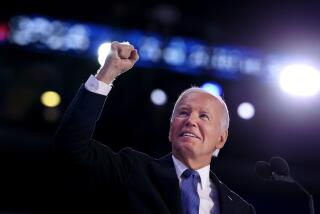Giving cover as election nears
WASHINGTON â Mixing contrition with defiant optimism, President Bush sought Wednesday to dispel questions from anxious voters and Republican candidates about the GOPâs wartime leadership in Iraq.
His White House news conference demonstrated that the president intended to remain a central participant in the midterm election, even though his approval ratings have slipped and most voters are unhappy with his Iraq policies.
But the appearance also underscored the challenge facing endangered Republicans less than two weeks before the Nov. 7 election as they look to the White House for a clear message on the war. Throughout the hour, the typically plain-spoken Bush offered descriptions of his plans for waging the war that were complicated and at times appeared contradictory.
In his opening remarks, for example, Bush acknowledged, âI know many Americans are not satisfied with the situation in Iraq. Iâm not satisfied, either.â
But asked moments later to assess the war, he responded adamantly, âAbsolutely, weâre winningâ the fight against terrorism.
He took full responsibility for the war, saying, âIf people are unhappy about it, look right to the president.â Later, he said it was up to the generals to ask for more troops if they needed them and said he would take advice from a bipartisan commission.
And after months of ridiculing Democrats who want a timeline for ending the war, he expressed support for âbenchmarksâ that would lead to U.S. troop drawdowns.
With uncharacteristic nuance, Bush explained that there is a âsignificant difference between benchmarks for a government to achieve and a timetable for withdrawal.â Yet later he said benchmarks would allow the Iraqi government to tell its people: âHereâs what we intend to do, and hereâs when we intend to do it.â
Though Bush is not on the ballot, the election for control of Congress has shaped up largely as a referendum on him and the war -- a formula that once worked in the GOPâs favor but has grown shaky.
Aides said Bush would maintain an aggressive schedule until election day, attending rallies across the country designed largely to mobilize the conservative voters that form his partyâs usually reliable base.
Wednesdayâs appearance in the White Houseâs East Room was intended not for those conservatives, but for moderate voters in competitive House districts. These voters have backed Bush and Republican incumbents in the past, but polls indicate they are wavering because of the war.
The White House has struggled in recent days to turn that tide, even abandoning the âstay the courseâ slogan that had been a staple of Bush speeches in which he accused Democrats of trying to âcut and run.â
The challenge facing Bush and GOP candidates was evident in a series of Los Angeles Times/Bloomberg polls conducted within the last week in five pivotal states -- Missouri, Ohio, New Jersey, Tennessee and Virginia. The polls showed that most likely voters in those states thought Democrats could be counted on to do a better job in Iraq.
But the surveys also showed that a plurality of likely voters said they were willing to stay in Iraq as long as it takes. These are the voters who White House strategists believe can be swayed by Bush before election day.
âThey just want someone to tell them that there is a plan, what the plan is, and that weâre going to win,â said one Republican strategist who requested anonymity while discussing internal deliberations.
Bush tried to do just that, saying that the administration was forging ânew steps to help secure Baghdad, and constantly adjusting our tactics across the country to meet the changing threat.â Five times in his brief introduction, Bush noted that the U.S. was adjusting its tactics against insurgents.
âWe cannot allow our dissatisfaction to turn into disillusionment about our purpose in this war,â he said in an apparent effort to strike a contrast with Democrats. âWe must not look at every success of the enemy as a mistake on our part, cause for an investigation, or a reason to call for our troops to come home.â
Bush seemed to be telegraphing advice for vulnerable Republicans who, for months, have struggled to defend the war.
âThey can take a look at what heâs saying, and it will help people express and frame what the president is trying to do,â White House Press Secretary Tony Snow said.
âThe point was not, âBoy, we got to give them talking points,â though I dare say it will be used for that.â
With Bushâs comments Wednesday, candidates suddenly have more to tell voters about the administrationâs plans in Iraq.
âThe more he can talk about this and allay fears and anger, itâs helpful,â said Florida-based GOP consultant David Johnson, who is involved in several campaigns.
Bush all but begged voters to blame him for the warâs problems, and to spare their local Republican congressional representative. But he also said he believed that the elections would turn on local matters, not the war.
âThis campaign has obviously got national implications to it, no question about it -- the Iraq war, the security of the country, economic vitality and growth,â he said. âBut each of these elections turn out to be local in their scope and in their character. And weâve got good candidates running hard. And weâre going to win.â
Bush taunted Democrats who believe they are sure to win the House and maybe the Senate next month, speaking with unusual detail about the power of the Republican Partyâs vaunted get-out-the-vote machine and the excitement among conservative voters.
âThereâs a lot of enthusiasm amongst the grass-roots activists,â he said. âOur people are going out there to man the phones and to put up the yard signs.â
Democrats, he said, are âdancing in the end zone. They just havenât scored the touchdown.â
*
More to Read
Get the L.A. Times Politics newsletter
Deeply reported insights into legislation, politics and policy from Sacramento, Washington and beyond. In your inbox three times per week.
You may occasionally receive promotional content from the Los Angeles Times.










